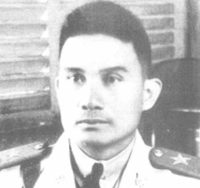The president calls for me to be at Camp Claudio early. I was there before he called. We inspected the horses and the stables. He saw the troops drilled. He asked me about the troop commander and I reported that the troop commander was about to be tried and probably he would be dismissed. He asked me of the offense and I said that it was immorality. My impression was that he is inclined to be lenient for offenders of this kind. I had his horse saddled up and the jump arranged. I gave him a demonstration on jumping and he was very much drilled.
At 9:30 he comes to headquarters to inspect.He looked over some offices downstairs and that came to Valdez office. We had a conference on the subject of concentration. P[illegible] wa present at this conference. He asked several questions. He asked to what extent we could reduce the number of trainees. I expressed the opinion that we should not reduce too much the number of trainees as the number figured is for local defense. On his suggestion that we have only a few thousand trainees near Manila, I said that policy would be disastrous. If we had only a few thousand concentrated near Manila, it would be necessary to give them plenty of mobility so that they could be moved to the threatened area quickly. This is contradictory to the MacArthur plan of local defense where the reservist of one locality defend that locality.
We are invited to luncheon at 1 oclock. We did not leave the palace until 4:30. He talked on various subject. The Montilla case the recall of the Scout officers, the case of Laconico and Villareal, the case of Torres. On the subject of Laconico and Villareal he said that Valdes brought my letter of protest to him accusing me of disloyalty in view of the fact that I tried to protest a decision which had already been rendered. The president said he could not understand how I could be accused of disloyalty for presenting my views. It was only after I had known the decision that I could express my opinion. He said he sent for MacArthur to find out the practice in the U.S. army whether a subordinate who express his opinion is considered disloyal. MacArthur told him “No,” provided such opinion were expressed thru proper channel. He told MacArthur he was glad of such advice as he was determined that such an expression by a subordinate did not constitute disloyalty and that he would have issued an order that it was not disloyal if in the U.S. Army, such act was considered disloyal. He looked at me and said “Segundo that was a strong letter.” He quoted my statement about personal circumstances and personal liason. He did not understand what I meant so he asked Sec. Vargas what I meant and Vargas said that Laconico is Santos aid and the son-in-law of Assemblyman Alano, then he understood. He ordered the name of Laconico removed from the list right away. Later we talked about Villareal and I said Villareal was not the best to go to school. The President said that it was only thru my letter that he knew such things were happening.
He spoke about the 6 hr. conference with MacArthur, the one published in the papers. He did not want the subject of this conference published or communicated to anyone. It was about the creation of the Department of National Defense.
